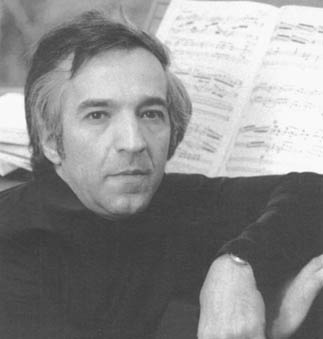
Vladimir Ashkenazy, a leading pianist and conductor, is renowned for his interpretations of Russian composers.
Pianist and conductor Vladimir Davidovich Ashkenazy was born on July 6, 1937, in Gorky, U.S.S.R. (now Nizhniy Novgorod, Russia), son of David and Evstolia Ashkenazy. He began piano studies at age six, and made his Moscow debut two years later. For ten years, Ashkenazy studied with Anaida Sumbatyan at the Moscow Central School of Music. In 1955, he enrolled in Lev Oborin’s class at the Moscow Conservatory, and was placed second in the Fifth Warsaw International Chopin Competition. The following year, he gained international prominence by winning the gold medal at the Queen Elisabeth International Competition in Brussels. Ashkenazy went on to share first prize with John Ogdon in the second Tchaikovsky Competition in 1962. His London debut in the Royal Festival Hall one year later was a critically acclaimed triumph, and launched him on a major performing career in the West.
Ashkenazy did not emulate his Soviet pianist predecessors Emil Gilels and Sviatoslav Richter, who stayed to be lionised as cultural heroes in the U.S.S.R. In 1962, Ashkenazy defected to England, where he lived until 1968. He then moved to Iceland, the native country of his wife, Thorunn Johannsdottir, where in 1971 he was awarded the Order of the Falcon. He became an Icelandic citizen in 1972.
Since the mid-1970s, Ashkenazy has become increasingly active as a conductor. He held the post of director of the Royal Philharmonic Orchestra, London, from 1987 until 1994. Also in 1987, Ashkenazy was appointed principal guest conductor of the Cleveland Symphony Orchestra. Since 1989, he has served as director of the Deutsches Symphonie-Orchester Berlin (formerly Berlin Radio Symphony Orchestra).
After years of a demanding piano concert schedule, Ashkenazy took a break in the 1980s, and only resumed occasional piano performances in the 1990s. He maintains an active recording career, both as a pianist and conductor. Ashkenazy is acclaimed by critics as the preeminent Russian pianist of his generation, who combines accurate interpretation with a sincere emotive power. His sensitive command of tone colour heightens expressive nuances, and encompasses both delicate fingerwork and impressive power. Renowned as an interpreter of PROKOFIEV, RACHMANINOV, and SCRIABIN, Ashkenazy commands a far-ranging repertoire, including solo and chamber music works by Beethoven, Brahms, Chopin, Liszt, Mozart, Schubert, and Schumann. His symphonic recordings of SHOSTAKOVICH and SIBELIUS have earned critical plaudits. Ashkenazy lives in Meggen, Switzerland.
Hao Huang
SEE ALSO:
CHAMBER MUSIC; LATE ROMANTICISM; ORCHESTRAL MUSIC.

Vladimir Ashkenazy, a leading pianist and conductor, is renowned for his interpretations of Russian composers.
FURTHER READING
Ashkenazy, Vladimir, and Jasper Parrot. Ashkenazy: Beyond Frontiers (London: Hamilton, 1985).
SUGGESTED LISTENING
As conductor: Beethoven: Symphonies Nos. 5 and 7; Sibelius: Complete Symphonies;
Mussorgsky–Ashkenazy: Pictures at an Exhibition.
As pianist: Beethoven: Piano Concertos; Chopin: Ballades and Nocturnes; Scriabin: Sonatas for Piano.